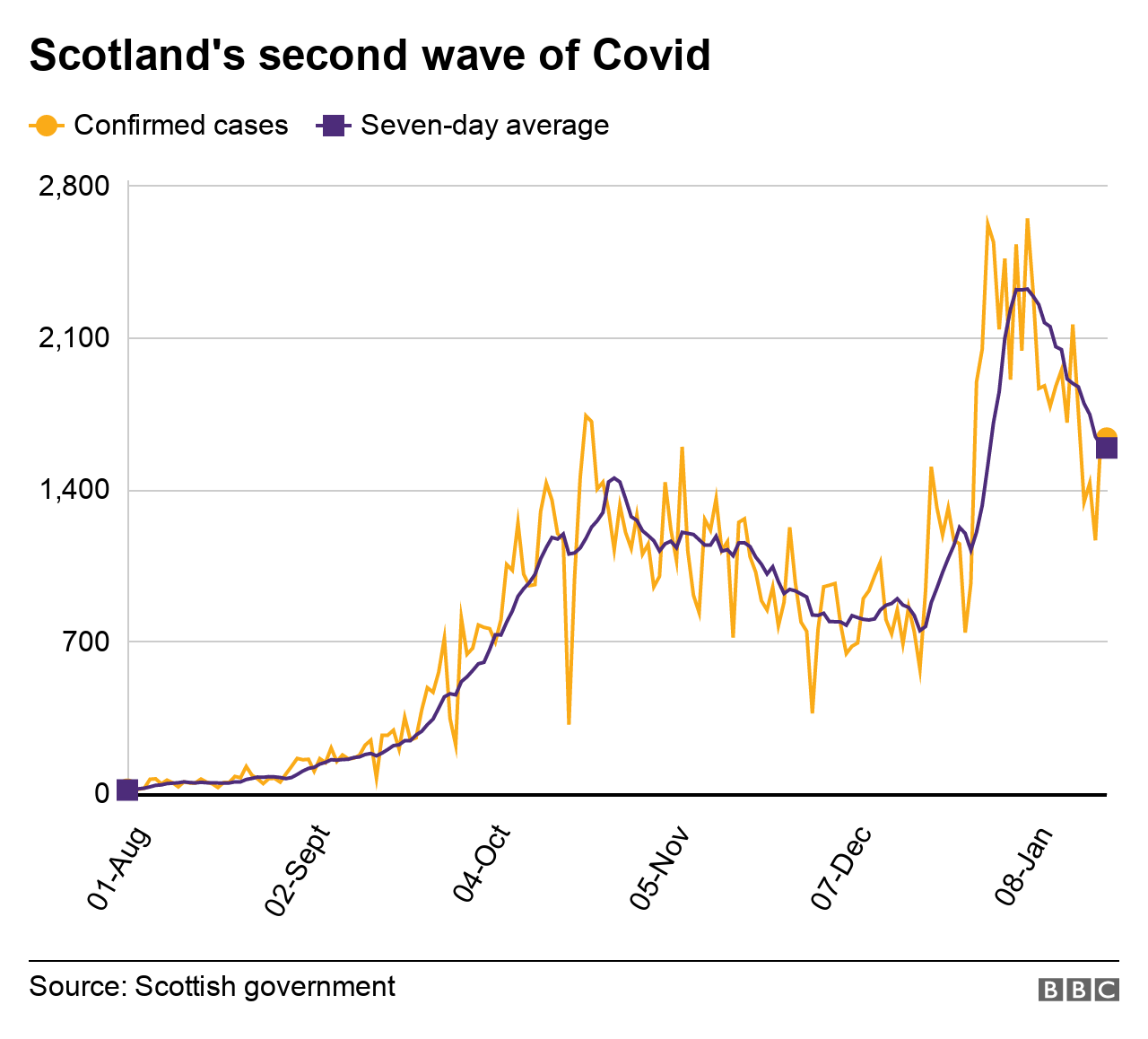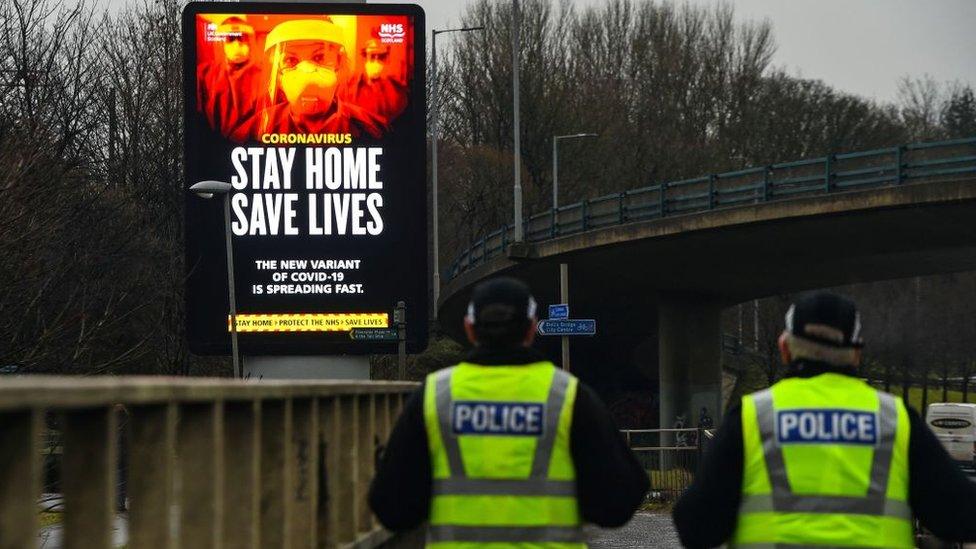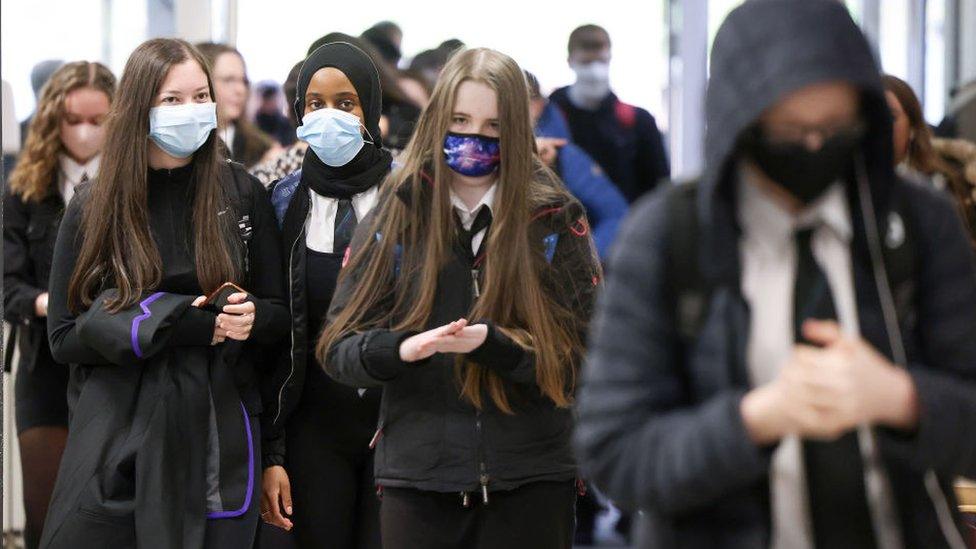Spread of Covid-19 in Scotland 'decelerating' as R number falls
- Published
- comments
'Infection rate signs are encouraging but case numbers still mean NHS pressure'
The spread of Covid-19 in Scotland appears to have fallen due to lockdown - but case numbers remain "concerningly high", John Swinney has said.
The deputy first minister said the "R number" measure of the spread of new infections may now be "around one".
He said this provided evidence that measures were "at least helping to stabilise case numbers".
And he said the government was "on track" to give a first dose of vaccine to all over-70s by mid-February.
National Clinical Director Jason Leitch said the fall in new daily cases was "encouraging", but warned that prevalence of the virus was still too high to ease restrictions.
A total of 1,636 new cases of coronavirus were announced on Thursday, accounting for 7% of people tested.
There are 2,004 people in hospital being treated for the virus, 161 of whom are in intensive care.
Mr Swinney said modelling suggested that the R number - the number of people on average that each person with the virus will infect - "may now be around one", and that it "has probably fallen in the past week".
A government analysis which was released later, external estimated that the R number was between 0.8 and 1.1 in Scotland. The previous week it was estimated to be between 1.0 and 1.4.
Prof Leitch said the spread of the virus appeared to be "decelerating", although he said the position was "very fragile".

And he warned that it would take time for the R measure to fall - and for that to have a knock-on effect on hospital admissions.
He said: "The R number is slow, it is always slow. The virus has a 10 to 14-day incubation period.
"We've been fully locked down for three weeks and semi-locked down for four - that's not even two incubation period of the virus. That's why we need to stick with it.
"It took eight to 10 weeks in lockdown one to get to the point where we were reporting single figures. It's important that people hold their nerve - the R number takes a long time to fall, and it then of course influences the prevalence of hospital admissions."

Mr Swinney - who is also education secretary - was questioned at the daily coronavirus briefing about the potential return of schools to face-to-face teaching.
At present most pupils are learning remotely from home, with only the children of some key workers and vulnerable pupils allowed in to school buildings.
Mr Swinney said a "phased approach" was likely to be taken to getting pupils back into classrooms, with "priority groups" likely to go back first.
He said he wanted to "get to that point at the earliest possible opportunity", but said there was not yet a clinical consensus about the spread of new strains of the virus among young people.

The vast majority of Scottish pupils have been home learning since the Christmas holiday
He added: "It will depend on advice about the impact of the virus on particular age groups and cohorts of pupils, and the general prevalence of coronavirus in our society, and we are obviously looking at that data on a very focused basis to take the judgements that are safe for pupils, staff and families."
Mr Swinney also said he would "ideally" give two weeks notice of a return to face-to-face learning, but that this may be shorter if an "opportunity" arose to get schools back more quickly.
UK Education Secretary Gavin Williamson has promised a two weeks notice period for English schools.
The deputy first minister also defended the pace of the vaccine programme, saying there was no "bottleneck" in the delivery of supplies to GPs and saying the government was "very confident" of hitting its targets.

